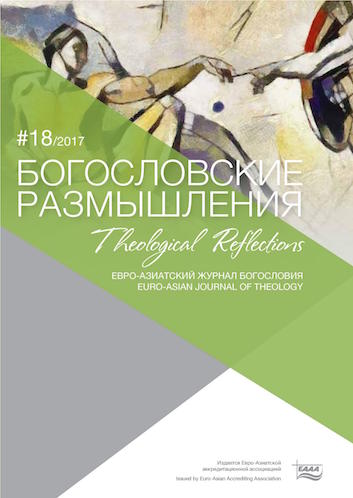A Declaration of the Sentiments of Arminius on Predestination, Divine Providence, the freedom of the will, the grace of God, the Divinity of the Son of God, and the justification of man before God (fragment, Jacob Arminius, translation by R. Tkachenko)
DOI:
https://doi.org/10.29357/issn.2521-179X.2017.18.157Keywords:
Jakob Arminius, Arminianism, Reformed scholasticism, Predestination, Free will, God's providence, Freedom of choice, God's grace, The divinity of the Son of God, Justification of man before GodAbstract
tion of the work of Jacob Arminius: (lat.) Declaratio sententiae I. Arminii de Praedestinatione, Providentia Dei, Libero arbitrio, Gratia Dei, Divinitate Filii Dei, & de Iustificatione hominis coram Deo; netherl. Verclaringhe Iacobi Arminii Saliger ghedachten: Aengaende zijn ghevoelen, so van de Predestinatie, als van eenige andere poincten der Christelicker Religie; daerinne men hem verdacht heft ghemaeckt; English A Declaration of the Sentiments of Arminius on Predestination, Divine Providence, the freedom of the will, the grace of God, the Divinity of the Son of God, and the justification of man before God.The translation is made on the basis of the Latin text of the work, prepared by Arminius' friend and colleague Peter Bertius: Jacobus Arminius, Opera theologica, ed. Petrus Bertius (Lugduni Batavorum: Apud Godefridum Basson, 1629), 91-134. This edition is considered to be the main one and in a certain sense classic.
Moreover, this translation is made in comparison with the classic English translation of the Latin text of this work, made by William and James Nichols - this is the so-called London edition of the works of Arminius (The London Edition): Jacobus Arminius (Arminius-Nichols), The Works of James Arminius, DD : Formerly Professor of Divinity in the University of Leyden, trans. William Nichols and James Nichols, vol. 1 (London:
Longman, Hurst, Rees, Orme, Brown and Green, 1825), 516-668.
It also takes into account the modern English translation of the Dutch version of the text in Jacobus Arminius and W. Stephen Gunter (Arminius-Gunter), Arminius and His Declaration of Sentiments: An Annotated Translation with Introduction and Theological Commentary (Waco, TX: Baylor University Press, 2012), 87 -157. It is based on a critical edition of the original Dutch Verclaringhe prepared by Gerith-Jan Hunderdahl: Jacobus Arminius and Gerrit Jan Hoenderdaal (Arminius-Hoenderdaal), Verklaring van Jacobus Arminius, Afgelegd in de Vergadering van de Staten van Holland op 30 Oktober, 1608 (Loc. De Tijdstroom, 1960). This is an adapted critical edition based on the original manuscript of Jacob Arminius and an early printed edition of this text: Jacobus Arminius, Verclaringhe Iacobi Arminii. Saliger ghedachten, In zijn leven Professor Theologiae binnen Leyden: Aengaende zijn ghevoelen, so van de Predestinatie, als van eenige andere poincten der Christelicker Religie; daerinne men hem verdacht heeft ghemaeckt (Leyden: Thomas Basson, 1610).
The latter is also used in this translation as a “secondary” primary source, so from time to time I will indicate in footnotes an alternative or, on the contrary, an explanatory sound of the Dutch text. However, it is worth noting that the Dutch language Arminius originally wrote, and which is used in this early publication of his Announcement, is a Reno-modern or late (if not post-) Middle Dutch (Dutch Middelnederlandsch, English Middle Dutch) variant of this language. It is already different from medieval, but not yet identical to modern Dutch.
References
- Without a list of literature
Downloads
How to Cite
Issue
Section
License
Copyright (c) 2020 Rostislav TKACHENKO

This work is licensed under a Creative Commons Attribution-NonCommercial 4.0 International License.
All articles published in the Journal are distributed under a Creative Commons Attribution-NonCommercial 4.0 International License
By submitting an article for publication in Theological Reflections: Eastern European Journal of Theology the author grants the editors the right to publish the article and distribute it in electronic and print form.
The author reserves all copyrights and the right to use the materials of the article in whole or in part for educational purposes, to write his own dissertations, to prepare abstracts, conference reports, oral presentations, etc., as well as post electronic copies of articles (including the final electronic version downloaded from the journal’s official website) on non-commercial web-resources without the consent of the editorial board and founders.



